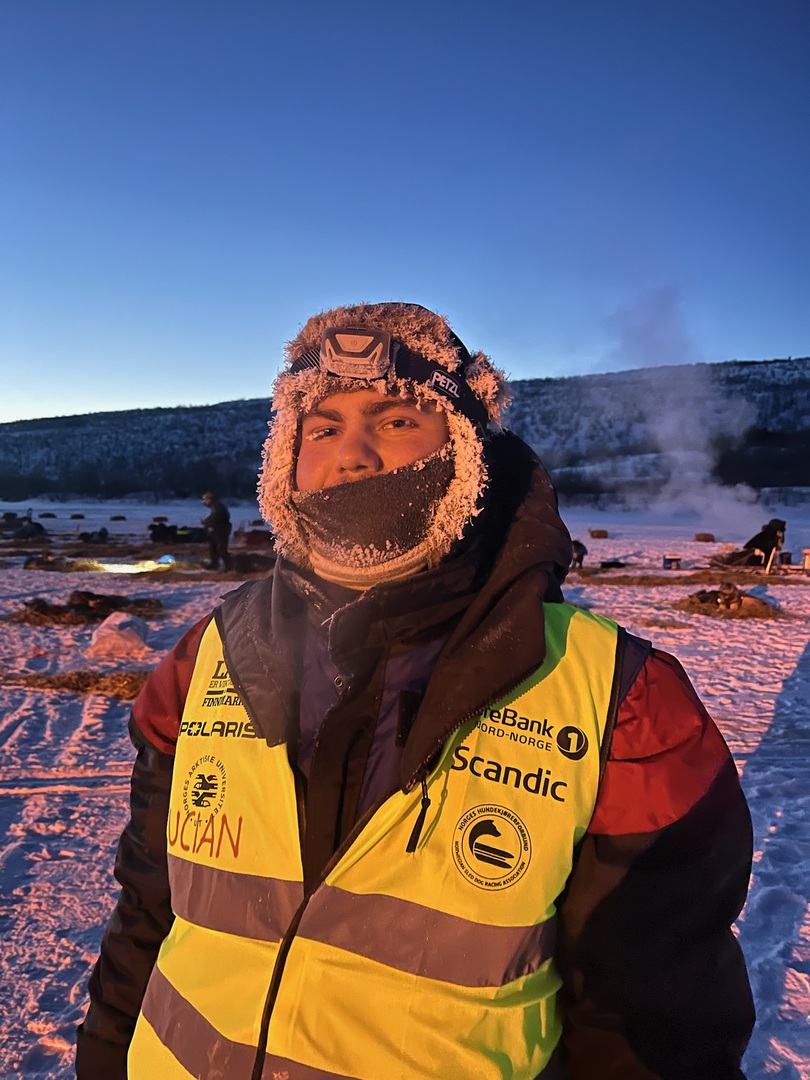“A once in a lifetime experience”
Travel days with extreme cold are no obstacle for the international students who assist during the Finnmark Race.

At the checkpoint Jergul in Karasjok, a small group of students from UiT have gathered to welcome the dog teams. The students' job is to guide the dogs from the team to their resting place, as well as to register their arrival at Jergul.

"The worst that can happen is if I lose a lead dog," says Emily Zander (25).
She is from Germany and studies outdoor life at UiT in Alta. She plans to become a teacher and intends to use what she learns about outdoor life with her future pupils.
Another student volunteering is Lucian Munz (25) from Germany. He also studies outdoor life at UiT.
"Being in the Arctic and helping with the Finnmark Race is a once-in-a-lifetime experience," he says.
He is very excited about the work he will be doing.
"I just hope I don't step on one of the dogs' paws. It would be awful to be responsible for something like that," he says.
Drove into a tree
The students do not arrive at Jergul completely inexperienced. They have been trained at Holmen Husky to ensure the job is done well.
"We learned how to handle the dogs, and we also got to try driving a dog sled," Munz explains.
"It was fun driving the dog sled, even though I drove straight into a tree," says Zander.
Through the training, they have spoken with several dog mushers, and she has noticed that winning is not the main focus for many of those participating in the Finnmark Race.
"They have such a positive attitude and a genuine passion for dog sledding. When passion comes first, I believe there is a greater chance of winning," says Zander.
Extreme cold was a challenge
There are many volunteers at Jergul since it is a major checkpoint where all the dog teams must have a mandatory stop. The students arrived at Jergul already on Friday to set up the camp. The extreme cold has reached Jergul, and the temperature was minus 32 degrees.

"The biggest challenge is the cold; it got very cold on my feet. But it's been fine nonetheless," says Munz.
"It's cold, difficult to get enough sleep and eat enough food to have the energy to do everything. But even though some things are difficult, it's also very nice to be here," says Zander.
"We stop all activity until autumn arrives"
It's the first time Munz has been as far north as Alta. He has noticed a significant difference between his home country Germany and Alta.
People in Arctic regions are much more active in winter, he believes.
"In Germany, we stop all activity until autumn arrives. Sports take a break, there's no carpentry or building outside, everyone stays indoors."
Munz likes the mindset people have in the north.
"Those I've spoken to here say they stay active through the winter to feel good, and that's especially important here during the dark season."
The students have done as the locals do, staying active throughout the winter while they've been in Alta.
As part of their studies, they will also travel to Anchorage in Alaska, where they will work on sustainability in Arctic regions.
"I don't know much about Arctic topics since I'm not from an Arctic place myself, so I'm looking forward to it," says Zander.
But first, they must complete the Finnmark Race. Several days of volunteering lie ahead of them.

And how has it gone leading the dogs into place?
"I haven't lost any dogs, so that's a success," says Zander.
Fortunately, I haven't stepped on any paws; it's been nice to guide the dogs into place," says Munz.
After a few days volunteering at Jergul, the students will move to Checkpoint Karasjok.
Zander and Munz have experienced the Arctic climate and culture. They have also witnessed the Northern Lights. Now there's just one thing left on the list.
"I'm not leaving here until I've seen the midnight sun," says Munz.
-
Nordisk - årsstudium
Varighet: 1 År -
Ergoterapi - bachelor
Varighet: 3 År -
Fysioterapi - bachelor
Varighet: 3 År -
Radiografi - bachelor
Varighet: 3 År -
Barnehagelærer - bachelor
Varighet: 3 År -
Organisasjon og ledelse for offentlig sektor - erfaringsbasert master
Varighet: 3 År -
Arctic Nature Guide - one year programme
Varighet: 1 År -
Arktisk friluftsliv og naturguiding - bachelor
Varighet: 3 År -
Arktisk friluftsliv - årsstudium
Varighet: 1 År -
Idrettsvitenskap - master
Varighet: 2 År -
Realfagskurs
Varighet: 1 Semestre -
Lektor i språk og samfunnsfag trinn 8-13 - master
Varighet: 5 År -
Trening, prestasjon og helse - bachelor
Varighet: 3 År -
Trening, prestasjon og helse, personlig trener - årsstudium
Varighet: 1 År -
Bevegelige bilder - bachelor
Varighet: 3 År -
Informatikk, datafag - bachelor
Varighet: 3 År -
Computer Science - master
Varighet: 2 År -
Menneskelig yteevne i Arktis - bachelor
Varighet: 3 År -
Menneskelig yteevne i Arktis - årsstudium
Varighet: 1 År




